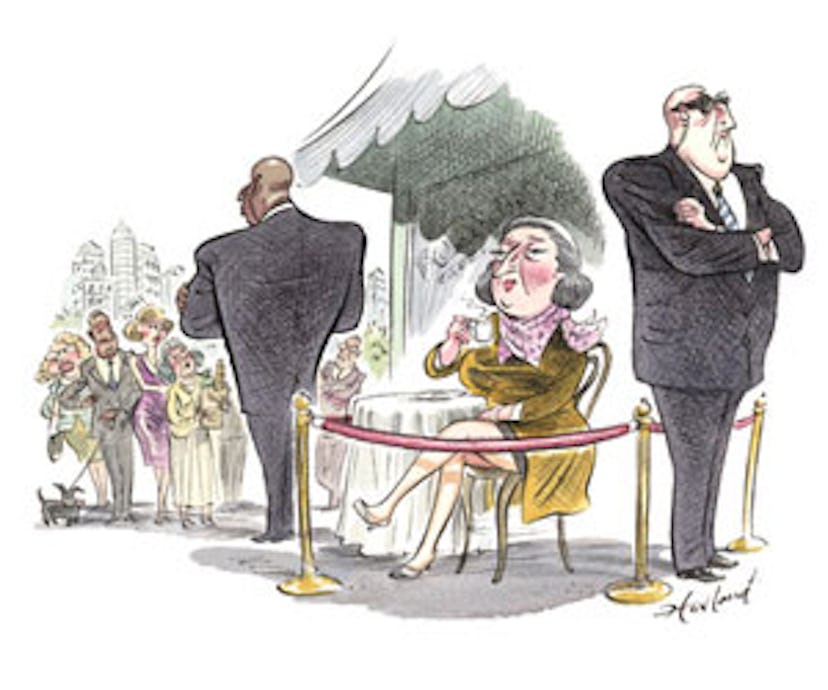The Countess’s Confession
Is “elitist” the new “liberal”? Louise laments the presidential race’s name-calling.

I have a dirty little secret—okay, quite a few. But my latest secret is one I’m willing to tell: I can never be president. Of course, the main stumbling block is that I’m Austrian. But it turns out there’s perhaps an even greater impediment: I am an elitist. And what’s wrong with that?
With all the mud thrown against the word in American politics—more precisely, aimed from the Clinton camp directly at Barack Obama—things have gotten way out of hand. When James Carville tells Newsweek that if Hillary Clinton gave Obama one of her testicles, “they’d both have two,” and Governor Mike Easley of North Carolina says Clinton “makes Rocky Balboa look like a pansy,” what is the world coming to?
Of course I’m an elitist—I’m a countess. And while I can drink a pils with the best of them, I prefer a good Bordeaux, would rather eat wiener schnitzel than bratwurst, and love to look at good art, listen to opera, and seek out new places and try new things. So don’t vote for me.
The truth appears to be that anyone with highbrow tastes should run away from politics in America. Why should candidates for president have to prove they are worth electing by downing shots and beers, playing basketball or bowling? As David Brooks wrote in The New York Times: “The Clinton campaign seems to want to reduce the entire campaign to one element: the supposed masculinity gap.” And I’m sure John McCain will keep up that drumbeat.
Everyone seems to have fixed in their minds that John Kerry lost the 2004 election for the Democrats because he was too elitist. By that logic, no one who went to an Ivy League school (including Hillary, who attended Yale Law School), reads Shakespeare or dines with a fashion designer should run for public office.
Thank goodness this presidential campaign is almost over—although I’m sure it’s going to get worse before it gets better. But it shows the problem with many people today. All the emphasis is on the common man, the man in the street, the white male voter who works for an hourly wage and didn’t go to college.
But the candidates don’t know him—and don’t really seem to care to. Do you think once the election is over, Hillary and Bill and their $109 million fortune will want to spend time with ordinary Joes? Well, I know quite a few of them, and here’s what I’d like to point out: They didn’t go to college, but they want their children to do so. They may be the common man, but they want to better themselves. They spend their entire lives working hard to improve their lot.
Isn’t that what America (and everywhere else in the world) has always been about? Doesn’t almost everyone—from the common man to socialites and fashion designers—want to become part of the elite? At the recent Costume Institute gala at the Metropolitan Museum of Art, Karl Lagerfeld and Donatella Versace were asked what superhero they would be. Each responded, “Myself.” They live in a universe of one, as everyone dreams.
When I ask others if there’s a problem with being elite, they almost all say no—with one caveat: Bettering yourself shouldn’t come at the expense of others. Hillary Clinton’s reputation among the White House staff when she was first lady was a bit on the mean side of crass. You can pretend you are in touch with the common folk, but that doesn’t mean you should treat people badly.
Thomas Friedman recently wrote in the Times that many think Hillary’s attacks on Barack toughened him up for the general election. “Sorry, we don’t need a president who is tough enough to withstand the lies of his opponents,” he opined. “We need a president who is tough enough to tell the truth to the American people.”
As Friedman says, millions of Americans want our country to matter in the world again and want it to be about “building wealth and dignity—big profits and big purposes. When we just do one, we are less than the sum of our parts.” But when we do both, as Timothy Shriver, chairman of the Special Olympics (and a member of the elite), points out, “no one can touch us.”